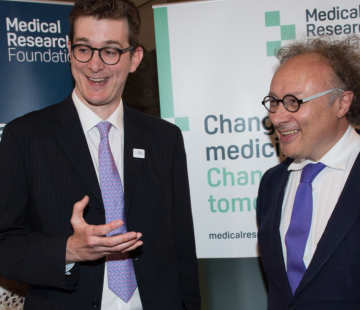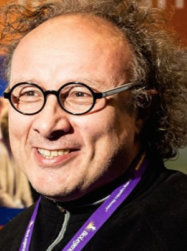Overview
Danny Altmann is a Professor of Immunology who has been based at the Hammersmith Hospital campus of Imperial College since 1994. He runs an immunology research lab which has a focus on HLA genes, T cells and NK cells in autoimmunity and infectious disease. Many of the research projects are run collaboratively with Professor Rosemary Boyton as co-PI
Research themes within global health and infectious disease immunology
Immunology research in the Altmann lab uses tools such as analysis of HLA polymorphism and the molecular immunology of T cell subsets and antigen responses to characterise adaptive immunity. The work spans human disease cohorts and transgenic models to study mechanisms in pathobiology.
The research has attracted generous support from diverse funders, in the UK, the EU and the USA, including the Medical Research Council, BBSRC, Wellcome Trust, US NIH-NIAID, DARPA, Innovate UK, Versus Arthritis and the Multiple Sclerosis Society
The lab has a strong involvement in immunology in a global health setting, especially in South America and SE Asia.
Recent work has been on adaptive immunity in severe infection including Zika virus, Chikungunya virus, Burkholderia pseudomallei, Yersinia pestis, Pseudomonas aeruginosa and Bacillus anthracis (anthrax). Melioidosis is a cause of considerable global concern due to the very large number of cases of lethal sepsis resulting from Burkholderia pseudomallei infection. Melioidosis research has been conducted in Thailand (collaboration with Prof Ganjana Lertmemongkolchai) and in Vietnam (collaboration with Dr Trinh Thanh Trung, Hanoi). A new programme from 2019 seeks to build a comprehensive picture of Burkholderia prevalence and immunity in the setting of Vietnam.
Arbovirus studies on Zika and Chikungunya immunology are conducted with collaborating labs in Brazil, including Prof Rodrigo Stabeli (Fiocruz) , Prof Joao Santana Da Silva (University of Sao Paulo), Prof Roque Almeida (University of Sergipe)and Prof Tatjana Keesen . Our research interests encompass emergent arbovirus threats and improving understanding of immune mechanisms that underpin differences between asymptomatic and severe infection, microcephaly or other neuropathological outcomes. A major, new, collaborative study starting in 2019 aims to decode the immune correlates of outcome following infection by Chikungunya virus – an infection associated with diverse acute and chronic sequelae, including severe arthritis.
A new collaboration with Profs Mel Newport and Gail Davey at The Wellcome Trust Brighton and Sussex Centre for Global Health Research is looking at at the immunology and immunogenetics of podoconiosis in Ethiopia. Podoconiois, sometimes termed non-filarial elephantiasis, is a disabling form of tropical lymphedema, highly HLA-associated, and thought to be triggered by a response to soil components.
The lab has made such wide-ranging contributions to target antigens and T cell mechanisms across a very wide range of viral and bacterial infections, benefitting from many years’ support through the NIH Epitope Discovery Program – a resource that seeks to generate the dataset to populate the ‘Immune Epitope Database’. Altmann is also consultant to the US Government anthrax vaccine programme at Pfenex (San Diego).
Research themes within autoimmunity, the microbiota and tumour immunotherapy
The team has a long track-record in analysis of immunogenetics and immunopathology of autoimmune diseases including rheumatoid arthritis, multiple sclerosis, Guillain–Barré syndrome and type 1 diabetes. A major current initiative, funded by Versus Arthritis, seeks to relate microbiota dysbiosis and immune subsets to new onset arthritis or arthritis with respiratory involvement.
Autoimmune immunotoxicity that can be severe and affect multiple sites is a major confounder in the clinical use of immunotherapy with monoclonals against, PD-1, PDL-1 and CTLA-4 in the oncology clinic. Altmann and Boyton are working with Dr David Pinato, Department of Surgery and Cancer , to better predict and characterize these autoimmune responses and to describe the impact of the microbiota on the successful response to immunotherapy.
Teaching and PhD supervision
Altmann has worked nationally and internationally as an ambassador and educator in immunology, training >20 PhD students from basic and clinical science including those from infectious disease, respiratory, rheumatology, renal and neurology. Please get in touch if you are interested in discussing PhD openings. He teaches extensively on immunology modules at Imperial College, including the Immunology MSc , and BSc courses Students are invited to get in contact to discuss potential lab placement research projects.
Altmann is a Trustee of the Medical Research Foundation and among roles there he has been one of the drivers in funding and establishment of the first national PhD studentship scheme in antimicrobial resistance - ‘Students.v.Superbugs’
Journal editorships
Altmann has been a key figure at British Society for Immunology (BSI) for 19 years as editor of their journals, including a 13-year stint as Editor-in-Chief at ‘Immunology’ – making him one of the longest serving editors in the field. He also holds Associate Editorships at ‘Vaccine’ and at ‘Frontiers in Immunology.’
Roles with research funders
Altmann has occupied diverse roles nationally and internationally in immunology and global health. He spent some years combining duties at Imperial College with a role at Wellcome Trust heading strategy on infection, immunity and population health.
He is a Trustee of the Medical Research Foundation where roles include chairing the annual Emerging Leaders Prize , which has recently highlighted leaders in lupus, then adolescent mental health and most recently, antimicrobial resistance.

Altmann is a board member and passionate advocate for the African Research Excellence Fund (AREF) - ‘Strengthening health research capacity in Africa’
Collaborators
Professor John Trowsdale, University of Cambridge, 2002 - 2009
Guest Lectures
Models of multiple sclerosis, VII World Congress on Alternatives and Animal Use, Rome, 2009
Immunogenetics of severe bacterial infection, Weizmann Institute of Science, Rehovot, Israel, 2009
Role of NK cells in MS progression, Marseille LUMINY, Marseille, France, 2009
Immunogenetics of autoimmune disease, NE Immunology Group, Newcastle University, 2008

